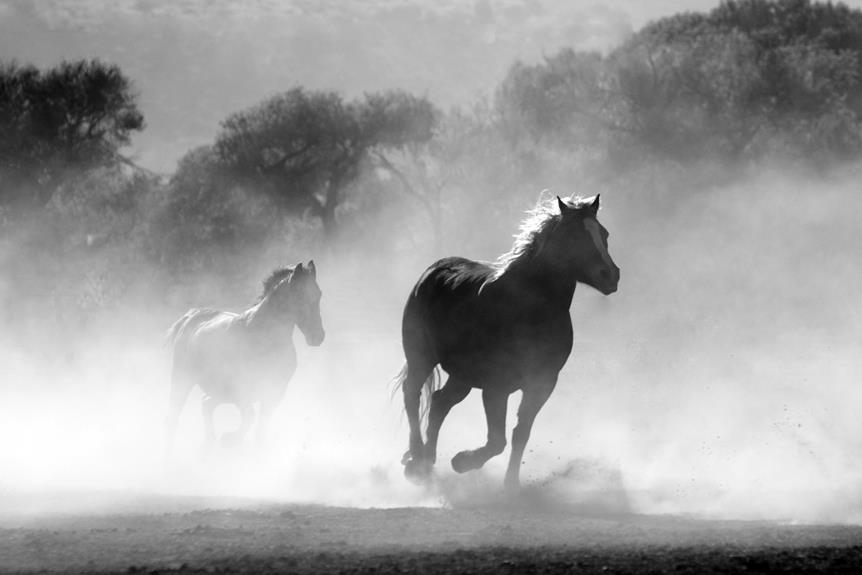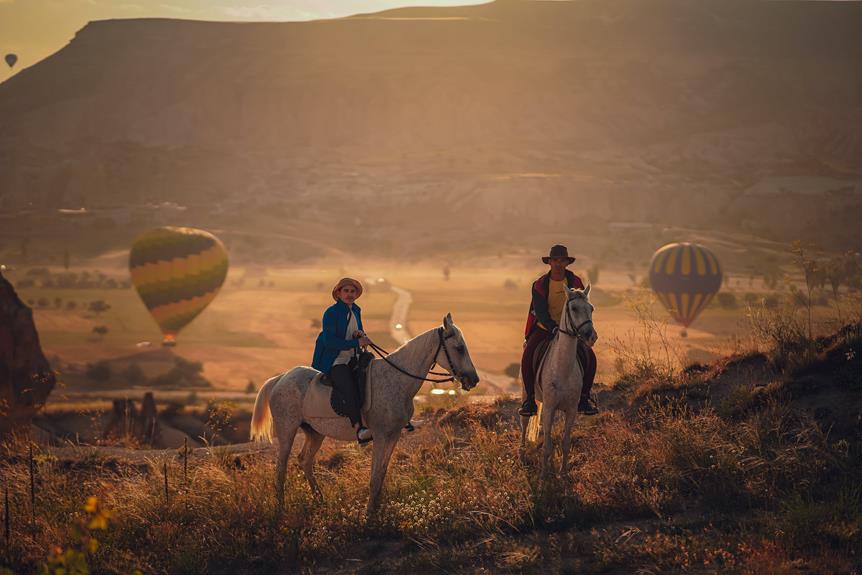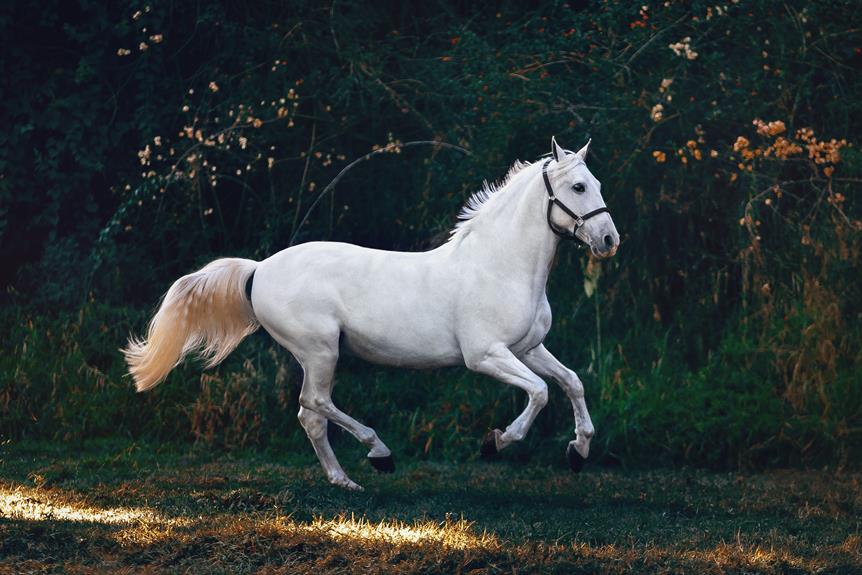As you stroll through the lush green pastures of the racehorse farm, you can't help but marvel at the majestic creatures gracefully galloping in the distance. Suddenly, a question pops into your mind: how much does it actually cost to own one of these magnificent beasts?
Well, my friend, the answer is not as straightforward as you might think. Behind the scenes of this glamorous world lies a complex web of factors that determine the price of a racehorse. And trust me, you'll be surprised to discover the range of figures involved.
But fear not, for I am here to shed light on this intriguing topic and guide you through the fascinating realm of racehorse ownership. So, buckle up and prepare to embark on a journey where the pursuit of speed and glory meets the reality of financial investment.
Key Takeaways
- The cost of a racehorse is influenced by factors such as age, breed, pedigree, performance, reputation of the seller, and initial purchase price.
- Various expenses, including monthly costs for training, veterinary care, and entry fees, as well as commissions for trainers and jockeys, contribute to the overall cost of racehorse ownership.
- Racehorses can be purchased through auctions, private sales, partnerships, recommendations from trusted individuals, or online platforms.
- To get the best price for a racehorse, one can negotiate with trainers, join a syndicate to share costs and ownership, explore different purchasing options, have a vet check done, and understand the factors that influence the cost.
Factors Affecting Racehorse Prices
Factors affecting racehorse prices include age, breed, pedigree, performance, and other related factors.
When it comes to the cost of a racehorse, there are several key elements that influence the price. First and foremost, age plays a significant role. Younger racehorses tend to have higher price tags compared to their older counterparts. This is because younger horses have more potential for growth and improvement in their racing careers.
Breed and pedigree are also important factors. Certain breeds, such as Thoroughbreds, are highly sought after in the racing world, which can drive up their prices. Additionally, horses with impressive pedigrees, meaning they come from a lineage of successful racehorses, are more valuable.
Performance is another crucial factor. Horses that have achieved success in races or have a proven track record command higher prices. These horses have proven their ability to compete and win, making them attractive prospects for potential owners.
Other related factors, such as the reputation of the seller and the current economic conditions, can also influence racehorse prices.
All these factors combined contribute to the varying costs of racehorses in the competitive world of Horse Racing and ownership of an expensive racehorse.
Cost of Owning and Maintaining a Racehorse
Now let's shift our focus to the financial aspect of owning a racehorse and explore the cost of maintaining and managing one.
The cost of owning and maintaining a racehorse can be quite significant. Apart from the initial purchase price, there are monthly expenses that need to be considered. These expenses include the cost of a horse trainer, which can range from $85 to $120 per day in Southern California. Additionally, there are costs for the blacksmith, veterinarian, dentist, chiropractor, and potential accounting and management fees. Entry fees, stakes race costs, commissions for trainers and jockeys, and potential accounting and end-of-year K1 preparation fees also need to be factored in.
On average, annual expenses for a racehorse can amount to around $45,000. Owning a racehorse is a costly investment, but the potential returns can be rewarding, especially if the horse performs well in races like the Breeders' Cup. The cost of purchasing a racehorse can range from $100,000 to $300,000, depending on factors such as age, bloodline, and performance.
It's important to note that owning and maintaining a racehorse requires additional expenses such as boarding, training, veterinary care, transportation, and insurance. It's worth mentioning that the most expensive racehorse ever sold was Green Monkey, purchased for a staggering $16 million.
Where to Buy a Racehorse
If you're considering buying a racehorse, there are several options available to you. Here's a list of places where you can buy a racehorse:
- Auctions: You can attend auctions such as Keeneland, where you have the opportunity to bid on racehorses. These auctions offer a wide range of horses, from promising young prospects to proven champions.
- Private Sales: Another option is purchasing a racehorse through private sales. This involves directly negotiating with the owner who's looking to sell the racehorse. Private sales allow for more flexibility in terms of price negotiation and selection.
- Partnerships: If you're not ready to take on the full financial responsibility of owning a racehorse, you can consider buying a percentage through partnerships like Little Red Feather Racing. This allows you to share the expenses and risks with other owners.
- Trainer and Jockey: Many racehorse owners buy horses through recommendations from their trusted trainer or jockey. These professionals have extensive knowledge and experience in the industry and can help you find the right horse for your goals.
- Online Platforms: There are also online platforms where you can browse and buy racehorses. These platforms provide detailed information about each horse, including their pedigree, training history, and performance records.
Ways to Get the Best Price for a Racehorse
To get the best price for a racehorse, it's important to explore different purchasing options and consider factors that influence the cost. One way to potentially reduce the cost of racehorse ownership is to negotiate with trainers for a lower day rate. This rate includes various expenses such as employee wages, feed, and supplies. By finding a trainer who offers a more competitive rate, you can significantly decrease your monthly expenses.
Another option to consider is joining a syndicate like Little Red Feather Racing. By pooling resources with other individuals, you can share the costs and ownership of multiple horses. This allows for a more cost-effective approach to racehorse ownership, as expenses are divided among syndicate members.
When purchasing a horse, it's essential to explore different avenues such as auctions, private owners, and claims races. Be sure to have a vet check done before finalizing the purchase to ensure that you're getting the best price and value for the racehorse. Additionally, understanding the factors that influence the cost of a racing horse, such as age, bloodline, training, performance, and health, can help you make informed decisions and potentially negotiate a better price.
Lastly, it's important to be aware of additional expenses in owning a racing horse, such as boarding, training, veterinary care, transportation, and insurance. By accurately assessing the total cost and negotiating for the best price, you can ensure that your investment is worthwhile.
The Return on Investment in Racehorse Ownership
When considering the cost of racehorse ownership, it's important to analyze the potential return on investment. Owning a racehorse can be a thrilling and lucrative venture, but it also comes with risks. Here are some key factors to consider when assessing the return on investment:
- Horse's Pedigree: A racehorse's pedigree plays a significant role in its potential for success on the track. Horses with strong bloodlines and a history of producing winners have a higher chance of achieving success.
- Ever Sold: The price of a racehorse can vary depending on its pedigree, age, and performance history. Some horses have been sold for millions of dollars, while others can be purchased for a fraction of that price.
- Kentucky Derby: Winning prestigious races like the Kentucky Derby can significantly increase a horse's value. These high-profile wins not only bring fame but also attract lucrative breeding and sponsorship opportunities.
- Horse Races: The number and quality of races a horse participates in can impact its return on investment. Successful horses that consistently perform well in top-tier races have the potential to earn substantial prize money and increase their value as breeding stock.
- Claims Races: Participating in claims races can provide an opportunity for a quick return on investment. These races allow owners to put up a claim for a horse and potentially win the race, earning a significant payout.
Understanding these factors can help you make an informed decision when deciding to buy a racehorse. Keep in mind that the return on investment can vary greatly, and careful consideration should be given to the horse's potential for success and the associated costs.
Frequently Asked Questions
What Is the Price of a Race Horse?
Racehorse prices vary depending on factors such as breed, age, and performance. Some of the most expensive racehorses have been sold for millions. However, there are affordable options like racing syndicates and shared ownership, considering the hidden costs and resale value.
What Does It Cost to Buy a Racehorse?
On average, buying a racehorse can cost anywhere from $100,000 to $300,000. The price is influenced by factors like age, bloodline, training, and health. Other expenses include breeding, training fees, hidden costs, auction prices, insurance, and resale value.
How Much Does a Kentucky Derby Horse Cost?
When buying a Kentucky Derby horse, several factors influence the cost, such as bloodlines, racing record, and auction versus private sale. Hidden costs of ownership exist, but financing options can help. Negotiating the price is key.
What Is the Price of a Horse?
The price of a horse can vary depending on factors like age, bloodline, training, and performance. Horse ownership involves breeding costs, training expenses, financial risks, insurance, and veterinary costs. Resale value can also be a consideration.
Conclusion
In conclusion, owning a racehorse can be a costly endeavor, with the purchase price ranging from $100,000 to $300,000 for top-quality horses. Additionally, annual expenses can reach up to $45,000, including various costs such as lodging, transportation, vet bills, and training.
However, joining a syndicate or partnership can help reduce costs and allow for shared ownership. This can make racehorse ownership more accessible and affordable for individuals who may not be able to afford the full cost on their own.
Despite the expenses, racehorse ownership can offer the potential for a high return on investment. If the horse performs well and wins races, it can generate substantial prize money and even increase its value as a breeding prospect.
So, while owning a racehorse may come with significant financial commitments, it can also be a rewarding and potentially lucrative venture for those willing to invest in it.



0 Comments